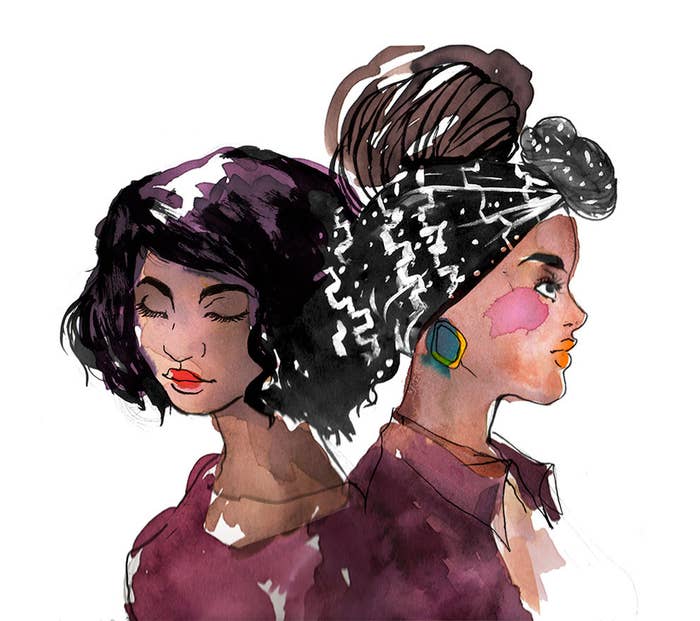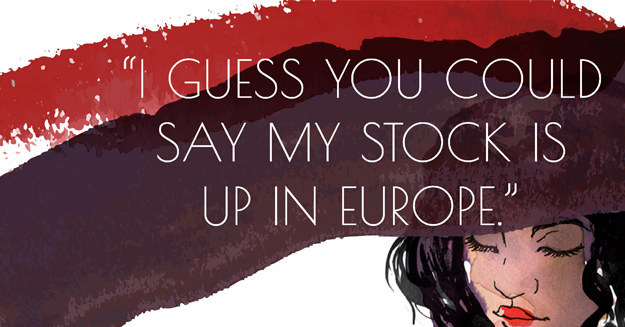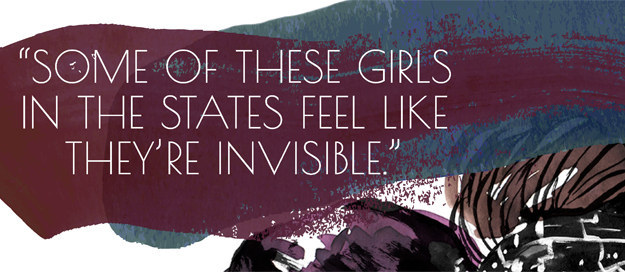
At first glance, Black Girl Travel seems to be like any other American international travel club, just one that caters exclusively to black women. But buried toward the bottom of its About Us page is a fuzzy YouTube video that indicates a wider problem.
The video is a defense of the company — directed at "haters" who have criticized Black Girl Travel for encouraging black women to date men in other countries.
"The heart of what we do is about empowering African-American women with options," says Fleacé Weaver, founder of Black Girl Travel, in the clip. "I have done a lot of research and talked to a lot of women in this country, and what I'm hearing is: You can't find dates, you can't find mates, you can't find husbands."
Weaver, a statuesque black woman flanked by two chic employees on either side, is all long lithe limbs and wavy hair. Her presence, despite the poor video quality, commands the screen.
"And I kind of thought about, like, well why is that? And as I started talking to [women] it's like, they're only dating black guys. Don't shoot me!" she exclaims, pressing her hands to her chest, then throwing them out in a shrug. "It's the truth. That's what's happening."
She cites her research, 2008 census data that suggests that even if every black man chose to partner with a black woman, there would still be 1.5 million black women left mate-less.
"That's why I created BlackGirlTravel.com. To get you to start thinking about dating interracially," Weaver says warmly. "There are a lot of incredible men out there, yes, you know you want a brother. ... That's what you want, right? And that's OK. But we know it's just not enough to go around!" Weaver's staff laughs along with her.
"What you gotta do is open your mind."

Weaver's not alone in her exhortation to black American women. The idea that we should travel abroad — particularly to Europe — to find love has a home in online discussion groups, travel websites, blogs, and Facebook pages, all of which earnestly and enthusiastically encourage us to "swirl," i.e., date non-black men (the term is designed to evoke a half-chocolate, half-vanilla soft-serve).
Though they vary in tone — some are celebratory, extolling the joys of finding "Swirling Success in Sweden" while others are bear hard-nosed messages like "The Dating Truth for Black Women: Go to Europe and Don't Look Back" — every site insists that black women in America are better off looking for love in another country.
I first came across the encouragements to go to Europe and "swirl" when I was a junior in college preparing to study abroad in Sweden. Though I cringe to admit it now, I was excited by the possibility of a semester spent flirting with Swedes. As a painfully self-conscious biracial woman, I had struggled to date at an Ivy League school, and studying abroad was as much an escape as it was a necessary academic endeavor for an international relations major. But I am also a European Union citizen, born in Hungary to a Hungarian mother and Nigerian father, and my optimism was tempered by the reality of my experiences living and traveling in Europe, experiences that taught me I was both Other and object. As much as I wanted to believe in sites that told me differently — that men across the pond were just waiting for my arrival — I felt like I also knew better.
And while these sites say they intend to expose black women to a world of possibilities, the "possibilities" seem to predominantly feature black women with white men — a move that, intentionally or not, presents interracial dating as aspirational. Kim Butler, a data editor from California who moved to Germany in 2011, pushed back on the argument that Europe is a solution to black female singlehood on her blog last year. She told me she's noticed many of the pro-"swirl" websites seem to be pushing one message: "What is right is white." But Butler says there is more of a conversation to be had. "Are we going to start talking about some of the issues going on in America, why there's not so many black female couplings ... or are we just going to say, 'Screw it! We'll just go to Europe and find a white guy.'"
"That's not what we're saying," Weaver told me via Skype from Rome. She's a former Los Angeles socialite who ran a once-popular site for affluent African-American Angelenos: blackweekly.com. "We say, 'Date all men.'"
And her statement was more or less repeated by nearly every one of the women I interviewed who advocate that black women date interracially and internationally. Several added that they tell women to "choose character over color." But it's difficult to scroll through picture after picture of beaming-black-woman-with-smiling-white-man and not feel that interracial relationships are being idealized, rather than simply celebrated, an experience discomfiting enough that it has at times made me question my own relationship with a white man.
"Once those images are posted and once they're permeating society, then a certain kind of picture is presented and reinforced about who black women should be with," Tiya Miles told me over the phone.
Last year Miles, the chair of African-American studies at the University of Michigan–Ann Arbor and a former MacArthur fellow, wrote about the issues facing black women and interracial dating for the Huffington Post. While "in a perfect world love would be blind," she wrote, in the United States — and its polarized racial landscape in which black is essentially bad and white is essentially good — our romantic decisions are also political ones, whether we'd like them to be or not.
The practical, not the political, was certainly the driving force for Weaver when she founded Black Girl Travel. The company, which was originally named Bella Italia before expanding to other countries, arranges tours for groups ranging from fewer than 10 to over 70. She could readily name all the women she's taken to Italy who are currently in relationships with, or married to, Italian men. But she insisted that Black Girl Travel's purpose isn't to convince black women that Europe is the solution to their singlehood.
"I'm not saying it is the promised land; I'm just saying you have more options," Weaver said.
Weaver is speaking to what she calls "the 1.5 million": the number of black women in America who outnumbered black men in 2008 (now 2.5 million according to current census data). The women who, even if every black man chose to date a black woman, would still be left without a partner. Because it assumes all black women are heterosexual, this figure can't accurately convey the number of single black women seeking a male partner. But black men are more than twice as likely than black women to marry outside their race, perhaps because stereotypes about black men and sexuality increase their desirability — while comparable parallels aren't often available to black women. According to some advocates of interracial dating, unlike black men, black women face a unique pressure to date within their race.
"Black women are the community," said Christelyn Karazin, founder of BeyondBlackWhite.com, author of Swirling, and creator of a new interracial dating show Swirlr, told me via Skype. "It's like what Alice Walker said: We're the mules. We're the mammies. We're not supposed to leave. We're supposed to be holding it down. 'I love my black kings, I'm holding it down!' Meanwhile, so many of us are so miserable and unhappy and think that we don't even deserve to be happy — that it's about being black first and a woman never."
Karazin, who also spearheaded a controversial movement advocating against single motherhood in the black communtiy, describes tangled and knotted long-standing ideas about black desirability and femininity — or, the supposed lack thereof. The slave trade turned black bodies into objects of toil and labor, and made black women's bodies desirable largely in the context of rape, which allowed slave masters to exert further control over them. Slapstick mammies made exultant, toothy-grinned claims on the screens of early 20th-century cinema, their large and lumbering figures merely vehicles for laughs. And black female sexuality has often only been portrayed in its most grotesque and sensational forms, those of Hottentot Venuses or conniving jezebels. Throughout American history black women were either desexualized or hypersexualized according to the whims and anxieties of whites in control of their images.
In America, with the exceptions of nearly exclusively light-skinned celebrities, to desire a black woman is to reach your hand into the bottom of the beauty standard barrel. It's why the adoration following Lupita has been so refreshing, and complicated. As recently as 2011, science (or, "science") has been used to claim that black women are decidedly unattractive. As black women in the United States, we're told not only that we likely won't get married, (based on oft-misconstrued statistics that apply only to women aged 25–29), but that trying via modern conventions like online dating are probably futile — after all, we're also the least likely to get messaged in online dating.

Malika Walker arrived in Rome two weeks ago as Weaver's new assistant. Her boss said she "can't even keep up with" how many dates Walker has been asked on since arriving.
"I guess you could say my stock is up in Europe," Walker told me, with an exuberant laugh. "I felt like Naomi [Campbell] when I got off the plane. When I walked through the airport, I felt like a supermodel."
Walker, who calls herself dark-skinned and repeatedly noted that she used to be heavier, moved to Italy from Atlanta, Ga. In Atlanta, she explained, light-skinned ideals made it difficult for her to date, though she had long ago learned to find validation from within rather than without. "Someone else's preferences don't define my value."
Chelsea Como, Weaver's other assistant who moved to Rome in 2012, echoed Walker's statements. As a self-identified "brown-skinned" woman in Miami, Fla., she found she couldn't live up to anyone's ideals of desirability.
"I felt like as a brown-skinned girl, there was nothing extraordinary about me as a black woman who's in shape but doesn't have a humongous booty or the whole Nicki Minaj-J.Lo body type," she told me. "I wasn't 'thick' enough."
The first time Como traveled with Black Girl Travel, in 2009, the script was completely flipped.
"When I came to Italy, it was like 'What a beautiful figure you have!' and 'Your skin is so beautiful, it shines!' or 'I love your smile!' The things that they looked at me [for] or complimented me on were things that I didn't value because I felt that the society I lived in didn't value them."
Como also admitted that getting honked at on the streets of Rome made her initially feel uncomfortable.
"I was very self-conscious, but then I embraced it," Como said. "I'd felt invisible for such a long time, and then when I came to Italy, Italian girls felt that I was competition ... In America, a white girl doesn't feel threatened at all by a black woman."
An aspiring singer-songwriter who traveled with Weaver four times before making the move to Italy, Como said she only started wearing her natural hair after she left the U.S. "If you could go somewhere, be yourself 100%, try, experiment, and whatever you did, people would appreciate that, wouldn't you want to be there?"
My thoughts have lingered longingly on this question — why, yes, I would want to be there. Yet, in the context of this Euro-topia, I wonder what to make of those in Italy who've derided their cabinet minister, Cecile Kyenge, as a "Congolese monkey" leading a "bunga-bunga goverment." I'm puzzled by the French family who decided it was appropriate for their 12-year-old son to present the French justice minister with a banana. And I'm at a loss to understand the actions of the Swedish minister of culture, who smiled at the opportunity to cut into a cake in the form of a black woman as the artist who created it screamed in agony, his face smeared in black paint.

"I can't tell you how many times I'm on a date and all the guy's doing is rubbing on my skin and telling me how much he loves the color of my skin," Weaver said. "One friend of mine has been married to my friend for 17 years, he said that he still loves her like he did from day one and that he likes touching her skin because her skin feels like velvet."
Some might say that sounds like a fetish or exotification, an issue many black women fear when they date interracially.
But Karazin chalked that up to "defensiveness," saying, "We're always so weary that if somebody appreciates what we look like and who we are, then we automatically go into the mode of 'Oh, they're fetishizing me.'"
Having grown increasingly frustrated for years by incessant and unsolicited comments about how I look, I have shielded myself to the point that I sometimes wonder whether I'm too quick to judge. But in my experience, the "keen interest" I've received from men in the European nations I've traveled to have been more about exotification than genuine appreciation. My skin, facial features, and hair have all been subjects of questioning and prodding, and on one occasion, in Romania, I left a public pool after an older man, who stared relentlessly for several minutes, eventually retrieved his cell phone and attempted to take pictures of me from a bench.
"It's just fingers in your hair all the time and 'Oh, you have such nice black skin,'" Butler said. "It's never really, 'What is your name?'"
She recalled a particular conversation she had with the cousin of an ex-boyfriend. After he deemed her "exotic," Butler told him that German people were also exotic to her. After all, she had never met an ethnic German before her boyfriend.
His response: "Oh, I'm normal."
Butler and other black women she is friends with in Berlin have learned to evaluate the interest they receive, asking questions that they hope will give them "a gauge of if this guy is thinking of us as a human or just a black woman who represents all black women." Despite the fraught navigation of being desired versus dehumanized, many women feel their travels were worth it.
"Some of these girls in the States feel like they're invisible," Weaver said. "That no one has even seen them, let alone speak to them or flirt with them or even taken the time to try to seduce them." On her tours, she focuses especially on trying to help dark-skinned black women, who, in a society that scales beauty according to a rigid color spectrum, are least likely of all to be seen as desirable.
"That's what they get out of it: knowing that they're beautiful," Weaver said. "That people find them attractive. It's not about the actual hook-up, it's about knowing that you're pretty. It's something that a lot of these girls haven't experienced in a long time, if they've ever experienced it, period."
